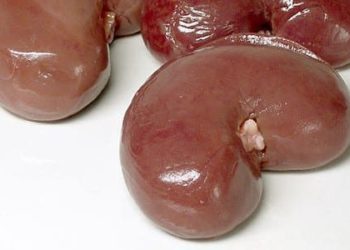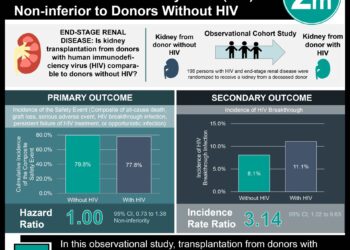HLA-incompatible kidney donation may increase survival compared to waiting
1. Donation with HLA-incompatible kidney confers a survival benefit as compared to staying on the waitlist indefinitely and also staying on the transplant waitlist and subsequently being transplanted with a deceased donor graft.
2. This survival benefit was statistically significant through 8 years of follow-up post transplantation.
Evidence Rating Level: 2 (Good)
Study Rundown: Given the limited resource of organs for kidney transplant, there have been numerous efforts, including accepting kidneys from expanded criteria donors, to increase available organs. One strategy for recipients is to undergo desensitization and accept a kidney graft from a human leukocyte antigen (HLA) incompatible live donor as opposed to remaining on the transplant waiting list. Given that patients with anti-HLA antibodies may remain on the waiting list without a suitable donor ever being identified, receiving an HLA-incompatible graft may provide better outcomes than waiting. This study aimed to determine the effect of transplantation with kidneys from incompatible live donors on survival as compared to matched controls who remained on the transplant waiting list or those who waited on the transplant list for decreased donor grafts.
Patients who received kidneys from incompatible live donors had higher survival rates than both the waitlist-or-transplant and waitlist-only control groups at 1, 3, 5 and 8 years. This survival benefit remained significant at 8 years across all levels of donor-specific antibody positivity. Strengths of this study include study of this important clinical question across multiple medical centres in the USA. Limitations include the study’s observational nature and thus one cannot assign causation.
Click to read the study in NEJM
Click to read an accompanying editorial in NEJM
Relevant Reading: Accepting Kidneys from Older Living Donors: Impact on Transplant Recipient Outcomes
In-Depth [retrospective cohort]: This retrospective cohort study gathered a sample from all adults that underwent kidney-only transplantation with kidney grafts from HLA-incompatible live donors performed at 22 transplantation centres in the USA from 1997 to 2011. All recipients of HLA-incompatible transplants first underwent perioperative desensitization therapy. Two sets of waitlisted-matched controls were used and were matched 5:1. The waitlist-or-transplant control group was made of patients who were initially waitlisted but some may have subsequently received a graft from a deceased donor. The waitlist-only group consisted of patients who never underwent kidney transplantation. These groups were followed for mortality rate as estimated by the Kaplan-Meier method and Cox modeling.
The study enrolled 1025 patients who received kidney transplants from incompatible live donors. Recipients of HLA-incompatible kidney grafts experienced a significant survival benefit compared to waitlist-or-transplant and waitlist-only control groups. In particular, receiving an incompatible kidney was associated with 13.6% increase in survival rate at 8 years follow-up (risk of death reduction 1.83, 95% CI 1.58-2.12; P<0.001) when compared to staying on waitlist or receiving a deceased donor transplant, and a 32.6% increase in survival rate at 8 years follow-up (risk of death reduction 3.37, 95% CI 2.92-3.90; P<0.001). Receipt of kidney transplant from HLA-incompatible donor was also associated with survival benefit at all donor-specific antibody levels.
Image: PD
©2016 2 Minute Medicine, Inc. All rights reserved. No works may be reproduced without expressed written consent from 2 Minute Medicine, Inc. Inquire about licensing here. No article should be construed as medical advice and is not intended as such by the authors or by 2 Minute Medicine, Inc.







